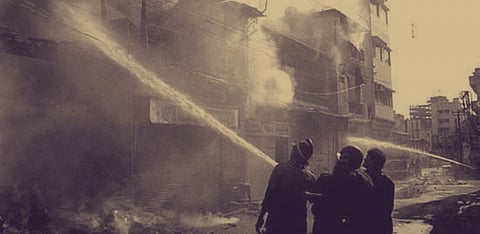

The trial against the two accused was held separately since they were absconding when the case was originally tried in Gujarat in 2003 and retried in Mumbai between 2004–06. With Tuesday's Order by a Mumbai sessions court, a total of 19 of the 23 accused have been acquitted in the Best Bakery case, where 14 people were burnt alive in Vadodara during the 2002 Gujarat pogrom.
—–
Two previously absconding persons accused of murder in the Best Bakery case were acquitted by a Mumbai sessions court on Tuesday.
Fourteen people were killed in March 2002 in Vadodara in a case that later came to symbolise the carnage of the Gujarat pogrom and the many pressures on witnesses of a massacre to stay silent.
Harshad Solanki and Mafat Gohil were tried separately from the 21 other accused in the case since the duo had been absconding when the Supreme Court ordered a retrial in 2004. The trial against Solanki and Gohil began in 2019 in Mumbai and concluded on Tuesday with their acquittal.
The retrial was ordered by the Supreme Court after a Gujarat sessions court in 2003 ordered the acquittal of all 21 accused in the case due to hostile witnesses and lack of evidence.
Solanki and Gohil were later arrested by the National Investigative Agency (NIA) in connection with the 2007 Ajmer Dargah bombing case in which reportedly three people had died and 17 others were injured. Their custody was transferred by the NIA to the Maharashtra police.
The Best Bakery incident took place on March 1, 2002 at around 8 p.m. when a mob began gathering outside the bakery, which was owned by a Muslim family and was situated in the Hanuman Tekri area of Vadodara.
Inside the bakery was Zahira Shaikh's family, including her mother, uncle and his family, two sisters, four brothers and a sister-in-law. Also present in the building were migrant labourers employed by the bakery. She and her family used to live directly above the bakery, and the labourers used to sleep on the terrace.
As per Shaikh's initial statement, as recorded in the first information report (FIR) and interviews to the media, the mob first stole all the goods kept in the bakery and thereafter set fire to the building and the people inside it. Fourteen people had died by the time the violence stopped the next morning.
In court on May 17, 2003, as many as 37 of the 73 witnesses, including Shaikh, turned hostile. As a result, the Gujarat fast track court acquitted all 21 accused, in a judgment delivered on June 27 of that year. While concluding that sufficient evidence did not exist against the accused, the presiding judge in that trial also criticised the state police for not investigating the incident properly.
In August of that year, the NHRC moved an SLP in the Supreme Court seeking a retrial outside Gujarat. Permission was granted by the court in April 2004.
In the fresh trial, a court in Mumbai convicted nine of the 21 accused in February 2006 on charges of murder, sentencing them to imprisonment for life. The conviction of five out of the nine was overturned by the Bombay High Court in July 2012.